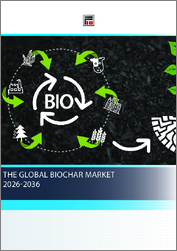
|
시장보고서
상품코드
1570612
입상 바이오차 시장, 기회, 성장 촉진요인, 산업 동향 분석과 예측(2024-2032년)Granular Biochar Market, Opportunity, Growth Drivers, Industry Trend Analysis and Forecast, 2024-2032 |
||||||
세계의 입상 바이오차 시장은 2023년에 7,740만 달러의 평가액에 달하며, 2024-2032년 예상 CAGR은 12.5%로 견고한 성장 궤도를 보이고 있습니다.
환경에 대한 관심이 높아지고 지속가능한 농업에 대한 수요가 증가함에 따라 토양개량제에 대한 수요가 증가하고 있습니다. 이 산업은 토양을 건강하게 만들고 작물 수확량을 늘리는 데 매우 중요한 토양 개량재에 대한 수요가 증가하고 있습니다. 탄소 격리, 수분 보유력 향상, 토양 비옥도 개선 등 바이오차의 장점이 널리 알려지면서 시장은 크게 확대될 것으로 보입니다.
지난 10년간 바이오차 산업은 틈새 전문 분야에서 주류 시장으로 전환했습니다. 초기에는 학술연구와 제한된 규모의 프로젝트가 원동력이었으나, 현재는 대규모 상업화와 투자가 이루어지고 있습니다. 초기에는 농업용 토양 개량에 주로 사용되었으나, 현재는 그 범위가 상당히 넓어졌습니다.
기술의 발전은 이러한 진화에 크게 기여하고 있습니다. 열분해 및 기타 제조 방법의 비약적인 발전은 바이오차 생산의 효율성과 확장성을 향상시켰을 뿐만 아니라 비용 절감에도 기여했습니다. 그 결과, 바이오차의 다양한 용도로의 활용이 확대되고 있습니다.
목질계 바이오차는 2023년 2,750만 달러의 평가액을 차지하며 2024-2032년 13.5%의 연평균 복합 성장률(CAGR)을 나타낼 것으로 예상됩니다. 목질계 바이오차는 임업 잔재, 목재 찌꺼기 등 다양한 원료로 만들어지며, 입상 바이오차 중 우세한 품종으로 두드러집니다. 그 지속가능성은 주목할 만하며, 임업 폐기물의 재사용과 지속가능한 산림 관리에 대한 노력과 일치합니다. 토양 개량용 바이오차 수요는 토양 구조 강화, 우수한 수분 보유력, 영양소 이용률 향상 등의 장점으로 인해 더욱 증가하고 있습니다.
입상 바이오차 시장의 토양 개량 분야는 2023년 2,620만 달러로 평가되며 2024-2032년 13.3%의 연평균 복합 성장률(CAGR)로 성장할 것으로 예상됩니다. 입상 바이오차의 주요 용도 중 하나인 토양개량은 농업에서 매우 중요한 역할을 하며, 토양을 건강하게 하고, 수분 보유력을 높이고, 작물 수확량을 증가시킵니다. 농가는 지속가능한 농업의 기초로 바이오차을 점점 더 많이 사용하고 있으며, 토양 비옥도를 높이고 화학비료에 대한 의존도를 낮추기 위해 노력하고 있습니다. 원예 분야에서 바이오차의 역할은 정원, 묘목장, 온실 등의 토양 조건을 개선하고 과일, 채소, 관상용 식물과 같은 고급 작물의 성장을 가속하는 데 중요한 역할을 합니다.
북미 입상 바이오차 산업은 연평균 13.4% 성장하여 2032년 8,510만 달러 규모에 달할 것으로 예측됩니다. 북미의 첨단인 농업 환경, 정부 지원 정책 및 환경 인식 증가로 인해 바이오차 제품에 대한 수요가 증가하고 있습니다. 미국은 광범위한 조사 구상, 견고한 농업 관행, 지속가능한 기술에 대한 상당한 투자에 힘입어 지배적 인 기업으로 부상하고 있습니다. 이 지역의 농업 부문은 토양의 건강성을 높이고, 작물 수확량을 늘리며, 화학 비료에 대한 의존도를 줄이기 위해 바이오차을 빠르게 도입하고 있습니다.
목차
제1장 조사 방법과 조사 범위
제2장 개요
제3장 업계 인사이트
- 에코시스템 분석
- 주요 제조업체
- 유통업체
- 업계 전체의 이익률
- 업계에 대한 영향요인
- 촉진요인
- 시장이 해결해야 할 과제
- 시장 기회
- 새로운 기회
- 성장 가능성 분석
- 원재료 상황
- 제조 동향
- 기술의 진화
- 지속가능 제조
- 그린 프랙티스
- 탈탄소화
- 지속가능 제조
- 원재료의 지속가능성
- 가격 동향(달러/톤), 2021-2032년
- 규제와 시장에 대한 영향
- Porter의 산업 분석
- PESTEL 분석
제4장 경쟁 구도
- 기업 점유율 분석
- 경쟁 포지셔닝 매트릭스
- 전략 전망 매트릭스
제5장 시장 규모·예측 : 제품 유형별, 2021-2032년
- 주요 동향
- 목질 바이오차
- 농업 폐기물계 바이오차
- 가축 분뇨계 바이오차
- 기타(도시 폐기물, 임업 잔재물)
제6장 시장 규모·예측 : 용도별, 2021-2032년
- 주요 동향
- 토양 개량
- 농업
- 원예
- 잔디·관상
- 사료
- 수처리
- 산업 폐수 처리
- 음료수 처리
- 탄소 격리
- 건설자재
- 기타(화장품, 의약품)
제7장 시장 규모·예측 : 유통 채널별, 2021-2032년
- 주요 동향
- 직판
- 유통·도매업체
- 온라인 소매업체
제8장 시장 규모·예측 : 지역별, 2021-2032년
- 주요 동향
- 북미
- 미국
- 캐나다
- 유럽
- 독일
- 영국
- 프랑스
- 이탈리아
- 스페인
- 기타 유럽
- 아시아태평양
- 중국
- 인도
- 일본
- 한국
- 호주
- 기타 아시아태평양
- 라틴아메리카
- 브라질
- 멕시코
- 아르헨티나
- 기타 라틴아메리카
- 중동 및 아프리카
- 사우디아라비아
- UAE
- 남아프리카공화국
- 기타 중동 및 아프리카
제9장 기업 개요
- Airex Energy
- American BioChar Company
- ArSta eco
- Biochar
- Carbonis
- CharGrow
- Circular Carbon GmbH
- Oregon Biochar Solutions
- Phoenix Energy
- PYREG
- Vedic Orgo LLP
The Global Granular Biochar Market reached a valuation of USD 77.4 million in 2023 and projections indicate a robust growth trajectory, with an anticipated CAGR of 12.5% from 2024 to 2032. This is largely fueled by escalating environmental concerns and a rising demand for sustainable agricultural practices. The industry is witnessing an uptick in demand for soil amendments, which are pivotal in enhancing soil health and boosting crop yields. As the advantages of biochar, such as carbon sequestration, improved water retention, and enhanced soil fertility gain wider recognition, the market stands on the brink of substantial expansion.
Over the past decade, the biochar industry has transitioned from a niche specialty to a more mainstream market. Initially spurred by academic research and limited-scale projects, the sector has now attracted significant commercialization and investment. While early applications predominantly focused on agricultural soil supplements, the horizon has broadened considerably.
Technological advancements have been instrumental in this evolution. Breakthroughs in pyrolysis and other production methodologies have not only amplified the efficiency and scalability of biochar production but have also driven down costs. This, in turn, has broadened the accessibility of biochar for diverse applications.
The overall industry is segmented into product type, application, distribution channel, and region.
The wood-based biochar segment accounted for a valuation of USD 27.5 million in 2023, with projections suggesting a robust expansion at a CAGR of 13.5% from 2024 to 2032. Wood-based biochar, derived from diverse feedstocks like forestry leftovers and wood waste, stands out as a predominant variant in the granular biochar landscape. Its sustainability credentials are noteworthy, aligning with initiatives to repurpose forestry waste and champion sustainable forest management. This variant's demand in soil amendment applications is also buoyed by its advantages, including enhanced soil structure, superior water retention, and increased nutrient availability.
The soil amendment segment in the granular biochar market was valued at USD 26.2 million in 2023 and is projected to grow at a CAGR of 13.3% from 2024 to 2032. As the primary application for granular biochar, soil amendment plays a pivotal role in agriculture for enhancing soil health, boosting water retention, and elevating crop yields. Farmers are increasingly adopting biochar as a cornerstone of sustainable farming, aiming to enrich soil fertility and curtail chemical fertilizer reliance. In horticulture, biochar's role is pronounced, enhancing soil conditions across gardens, nurseries, and greenhouses, and thereby fostering the growth of premium crops, including fruits, vegetables, and ornamental plants.
North America granular biochar industry is set to grow at a CAGR of 13.4% and is projected to reach USD 85.1 million by 2032. North America's advanced agricultural landscape, supportive government policies, and heightened environmental consciousness collectively bolster the demand for biochar products. The U.S. emerges as a dominant player, underpinned by extensive research initiatives, robust agricultural practices, and a pronounced investment in sustainable technologies. The region's agricultural sector is swiftly integrating biochar, aiming to enhance soil health, boost crop yields, and diminish reliance on chemical fertilizers.
Table of Contents
Chapter 1 Methodology and Scope
- 1.1 Market scope and definition
- 1.2 Base estimates and calculations
- 1.3 Forecast calculation
- 1.4 Data sources
- 1.4.1 Primary
- 1.4.2 Secondary
- 1.4.2.1 Paid sources
- 1.4.2.2 Public sources
Chapter 2 Executive Summary
- 2.1 Industry 360° synopsis
Chapter 3 Industry Insights
- 3.1 Industry ecosystem analysis
- 3.1.1 Key manufacturers
- 3.1.2 Distributors
- 3.1.3 Profit margins across the industry
- 3.2 Industry impact forces
- 3.2.1 Growth drivers
- 3.2.2 Market challenges
- 3.2.3 Market opportunity
- 3.2.3.1 New opportunities
- 3.2.3.2 Growth potential analysis
- 3.3 Raw material landscape
- 3.3.1 Manufacturing trends
- 3.3.2 Technology evolution
- 3.3.2.1 Sustainable manufacturing
- 3.3.2.1.1 Green practices
- 3.3.2.1.2 Decarbonization
- 3.3.2.1 Sustainable manufacturing
- 3.3.3 Sustainability in raw materials
- 3.3.4 Pricing trends (USD/Ton), 2021 - 2032
- 3.3.4.1 North America
- 3.3.4.2 Europe
- 3.3.4.3 Asia Pacific
- 3.3.4.4 Latin America
- 3.3.4.5 Middle East and Africa
- 3.4 Regulations and market impact
- 3.5 Porter's analysis
- 3.6 PESTEL analysis
Chapter 4 Competitive Landscape, 2023
- 4.1 Company market share analysis
- 4.2 Competitive positioning matrix
- 4.3 Strategic outlook matrix
Chapter 5 Market Size and Forecast, By Product Type, 2021-2032 (USD Million, Tons)
- 5.1 Key trends
- 5.2 Wood-based biochar
- 5.3 Agricultural waste-based biochar
- 5.4 Animal manure-based biochar
- 5.5 Others (urban waste and forestry residues)
Chapter 6 Market Size and Forecast, By Application, 2021-2032 (USD Million, Tons)
- 6.1 Key trends
- 6.2 Soil Amendment
- 6.2.1 Agricultural
- 6.2.2 Horticultural
- 6.2.3 Turf and ornamental
- 6.3 Animal feed
- 6.4 Water treatment
- 6.4.1 Industrial wastewater treatment
- 6.4.2 Drinking water treatment
- 6.5 Carbon sequestration
- 6.6 Construction materials
- 6.7 Others (cosmetics and pharmaceuticals)
Chapter 7 Market Size and Forecast, By Distribution Channel, 2021-2032 (USD Million, Tons)
- 7.1 Key trends
- 7.2 Direct Sales
- 7.3 Distributors and wholesalers
- 7.4 Online Retailers
Chapter 8 Market Size and Forecast, By Region, 2021-2032 (USD Million, Tons)
- 8.1 Key trends
- 8.2 North America
- 8.2.1 U.S.
- 8.2.2 Canada
- 8.3 Europe
- 8.3.1 Germany
- 8.3.2 UK
- 8.3.3 France
- 8.3.4 Italy
- 8.3.5 Spain
- 8.3.6 Rest of Europe
- 8.4 Asia Pacific
- 8.4.1 China
- 8.4.2 India
- 8.4.3 Japan
- 8.4.4 South Korea
- 8.4.5 Australia
- 8.4.6 Rest of Asia Pacific
- 8.5 Latin America
- 8.5.1 Brazil
- 8.5.2 Mexico
- 8.5.3 Argentina
- 8.5.4 Rest of Latin America
- 8.6 MEA
- 8.6.1 Saudi Arabia
- 8.6.2 UAE
- 8.6.3 South Africa
- 8.6.4 Rest of MEA
Chapter 9 Company Profiles
- 9.1 Airex Energy
- 9.2 American BioChar Company
- 9.3 ArSta eco
- 9.4 Biochar
- 9.5 Carbonis
- 9.6 CharGrow
- 9.7 Circular Carbon GmbH
- 9.8 Oregon Biochar Solutions
- 9.9 Phoenix Energy
- 9.10 PYREG
- 9.11 Vedic Orgo LLP



















